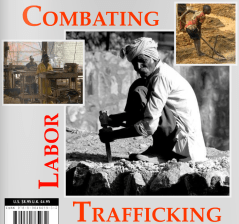
Journal of International Peace Operations
Congressional hearings and recently-introduced legislation have put the spotlight on the issue of U.S. taxpayer-funded labor trafficking, and the abuse of third-country nationals overseas by U.S. military contractors. One of the leading associations of U.S. overseas contractors has devoted the latest issue of its journal to the topic of trafficking – a sign that the contractor community is well-acquainted with the topic.
“The U.S. Congress’s newfound interest in addressing the problem of labor trafficking is certainly welcome, given that the issue has long plagued U.S.-led operations in Afghanistan and Iraq,” writes Doug Brooks, president of the International Stability Operations Association, in the May/June issue of its Journal of International Peace Operations.
Even as the U.S. military has departed from Iraq and plans are for a drawdown in Afghanistan, U.S.-funded contractors and subcontractors continue to have a presence in these countries and other places in the region, such as Kuwait. With the likelihood that the U.S. will continue to rely heavily on a labor force recruited from South Asia and other regions for work ranging from construction to laundry to food service, the abusive practices that can occur in this globalized labor supply chain are still a concern.
Laura Lederer, who was involved in the George W. Bush administration’s anti-trafficking efforts, authors one of the articles in the issue. “DOD has responded quickly and efficiently when human trafficking has been found in DOD labor contracts, taking measures to address particularized problems,” she writes, “but to date, DOD’s response has been largely reactive.”
Brooks points some of the blame at the U.S. government. “Some well thought-out laws and regulations already on the books have been under-enforced for years by the governmental entities running the missions,” Brooks says.
In late March, one of the Defense Department’s top enforcers testified before a House subcommittee hearing on trafficking and contractors. Retired Ambassador Kenneth P. Moorefield, a deputy inspector general at the Defense Department, explained some of the difficulties in investigating and prosecuting contractor-related trafficking-in-persons, also known as TIP.
“There have been systemic obstacles which have hindered successful TIP criminal investigations,” Moorefield said in his written testimony before Congress, “including jurisdiction limitations, foreign law enforcement capabilities, command investigative standards of evidence, and the challenges of evidence collection in contingency operation contracting environments…In spite of these difficulties, since 2006 the Defense Criminal Investigative Service of the DoD Office of Inspector General has investigated 21 TIP-related allegations worldwide, resulting in five cases being referred to the Department of Justice, of which one was accepted for prosecution.”
But not all of these are related to Pentagon contractors overseas. For instance, Moorefield said that “the violation in the accepted case was determined to be centered more on fraud against immigrants than on human trafficking, and, in any case, did not have a Defense Department nexus. Therefore, the Defense Criminal Investigative Service closed its investigation. The case was pursued by local law enforcement organizations and the U.S. Immigration and Customs Enforcement of the Department of Homeland Security.”
Moorefield also said new info on trafficking violations cropped up in a recent Department of Defense Inspector General audit in Afghanistan.
“During our fieldwork, the DoD IG team was made aware of an investigation recently conducted by the NATO International Military Police that had identified an Afghan company as involved in TIP violations,” Moorefield said. He noted that the government contracting officer recommended the company be blocked from winning new contracts.
“Additionally, the team was informed by third country nationals at one U.S. base that they were living in what could be adverse living conditions,” he added. “We referred this complaint to the prime contractor, the U.S. contracting organization responsible for the administrative oversight of the contract, and the base commander/commandant, who initiated an immediate investigation.”


